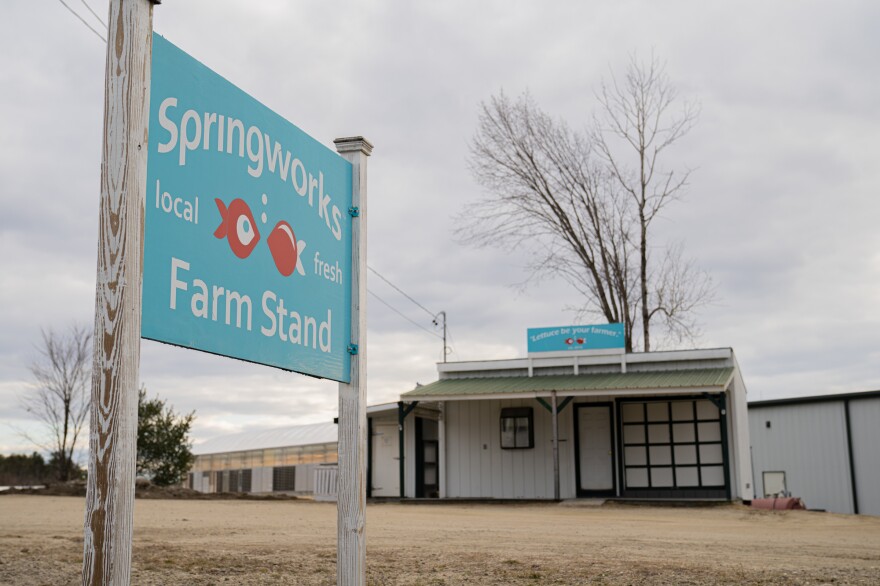Fish and plants often support each other in nature. A small but growing set of businesses in Maine are using that symbiotic relationship to grow produce and fish close to home.
Take Springworks Farms in Lisbon, which at first glance looks like an ordinary, if industrial, farm. Rows of Bibb, romaine and green leaf lettuce stretch all the way to the back of the structure. Grow lights overhead supplement the sunlight. Fans move the air around and keep the room cool.
This story is part of our series "Climate Driven: A deep dive into Maine's response, one county at a time."

But look more closely and you can see the greens are actually floating on buoyant rafts. Their roots dangle in the water, where they get their nutrients directly. On a Tuesday afternoon in March, two workers clad in waders pushed bobbing trays of seedlings through the water into neat, orderly grids.
Trevor Kenkel, the founder of Springworks, says the new crops still have some time before they're ready to go.
"It'll be another couple of weeks before they head into their final stage. And then a couple more weeks before we'll harvest them as heads," he said.
It's a process called aquaponics, a hybrid of hydroponics and aquaculture. Fish raised in tanks produce nutrients as they eat and produce waste. That water is then used to feed and grow the produce. The plants filter the water, making it safe for the fish to live and grow in.
Springworks is perhaps the biggest aquaponics production in the Northeast, producing around 2 million heads of organic lettuce every year and up to 200,000 pounds of tilapia.

"It's amazing how much people have come around even on the idea of growing greens in the Northeast," Kenkel said. "You know, we first got into business, I think people thought we were pretty crazy. And now that has really, that sentiment has really shifted."
Supporters of aquaponics praise it for using less water and less land than traditional agriculture to grow crops. It is also seen as a sustainable alternative to ocean fishing, the future of which is threatened by warming sea waters and over harvesting. There are just a few places doing it in Maine, but the increase in demand for local food and fish could spur its rise in the future.
"I think that we need to diversify how we grow these organisms for food," said Scarlett Tudor, an education and outreach coordinator for UMaine's Aquaculture Research Institute.
Tudor said one of the exciting possibilities of aquaponics is that it can reduce the distance that fresh produce and fish have to travel to get to consumers. It can also solve one of the problems created by land-based aquaculture:
"When we have these land based technologies, they come with waste streams, and what do we do with that?" she said. "Well, we should be growing more food with that."


Tudor said by controlling the growing environment, fish are protected from parasites, acidification and warming ocean temperatures.
The operating scale is much smaller at Canopy Farms in Brunswick. The project is a partnership between Tao Yuan restaurant owner Cara Stadler and Canopy Farms co-founder Kate Holcomb. The greenhouse sits above the ZaoZe Cafe & Market in the downtown. Plants and fish grown there are primarily sold at farmers markets, retail and through community supported agriculture. The rest is sold to Tao Yuan to use in its dishes.
There’s a variety of crops in the greenhouse, from hot peppers and tomatoes to Chinese chives. And there are some varieties that are less well known.
“And this is red Malabar spinach," said Canopy Farms director Jenna Grossbarth, plucking a leaf from the vine. "A lot of people haven't heard of it before. It's a climbing spinach. And it's really good when it's raw. It's really fresh tasting. It's really juicy.”
Here, the plants mostly sit on top of the water through holes cut into Styrofoam. Some crops, such as the climbing spinach, need a clay base to root in. And in a few places, lettuce is seeded directly into PVC pipes.
Grossbarth estimates the farm produces thousands of pounds of produce every year in just 1,700 square feet of growing space, or .04 acres of land. The amount of water and nutrients added to the system is far less than what a traditional farm would use.
Springworks and Canopy Farms are among just a handful of businesses using aquaponics in the state of Maine. But that could change: schools are building greenhouses with aquaponic systems for educational purposes. And Tudor, the UMaine coordinator, said students can learn how to manage their own aquaponics through the university's 4-H program.
The demand for local vegetables is also helping other small food ventures in Maine to thrive. Matthew Nixon of Muddy River Farm Aquaponics in Topsham is primarily interested in growing upland oysters. But he thinks aquaponics systems could become more popular as ocean fisheries become more depleted in the future.
Maine's fisheries have faced climate difficulties in recent years. Lobsters are moving north and invasive green crab populations are exploding as waters warm in the Gulf of Maine.
"One of the reasons I went into this business now is that when that peak passes, there's going to be a lot of need for an additional revenue source for people who are used to working on the ocean," he said.

In the greenhouse at Springworks Farm in Lisbon, Trevor Kenkel plucks a head of lettuce nearly ready for market. Because lettuce grows quickly, he says their product goes from greenhouse to shelves within 48 hours. That speed is what sets aquaponics apart from traditional farming, he thinks.
"It's a much better quality product. And so I think it also makes people more likely to want to eat their salad and not see it as a chore," he said.
The company announced recently that it will break ground on its fourth and biggest greenhouse in April. Kenkel says there are plans to hire 40 additional people once it is completed.



